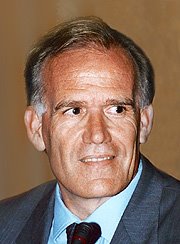Hiatus
I will be taking some time off from blogging for a short while to recharge my batteries. My brain needs a rest.
From the Kingdom >>> through the Church >>> and into the Culture. Book, Film, Television and Music Reviews. Random thoughts on how the Church is impacting the culture with the Truth, plus some general, random thoughts about whatever's on my mind. All work copyright © Mark W. Weaver unless otherwise noted.
I will be taking some time off from blogging for a short while to recharge my batteries. My brain needs a rest.
 Everyone has a story.
Everyone has a story.In my article, The Storyteller, I broke down the essential components of the story into five:
1. Setting: For the Christian with a mission, our stories take place in both broad and localized settings. And there are several.
Jesus said, "go into all the world ..." So, first and foremost, the earth itself is the overall setting for our story, for we have been commissioned to take His story to its four corners.
But there are other, localized settings as well, the turf on which our day-to-day stories unfold. The smallest, but yet most important setting of all, is our home, the place where we live with our family. Here, our story is played out in unmasked detail. Here, we are known most intimately, and our true selves are regularly exposed to the scrutiny of those we love most dearly.
We also live in several larger communities. Among them are the local church, our circle of friends, the workplace, our town, and other, smaller collections of people. Each represents a different mix of characters and personalities. Each presents its own challenges and opportunities.
2. Characters: Every story has at least two characters, a protagonist, or good guy, and an antagonist, or bad guy.
As the protagonist in my own story, I am challenged daily by a formidable foe, the devil. My purpose is to serve God, while my antagonist's purpose is to thwart me from my purpose. The day-to-day struggle between us brings the story its texture, its composition, its ebb and flow.
3. Plot: Every story is set into motion when the protagonist (that's me) discovers his goal and begins to move forward to achieve it. For the Christian (that's me again), our goal is to fulfill God's mission or purpose for our lives. Once we encounter that mission, or hear that call to service in our hearts, the plot of our story begins to unfold.
4. Conflict: Almost as soon as we begin, we encounter difficulty. Our foe, that nasty, antagonist devil, sets out to derail us from the track God has designed to take us toward His purpose, our mission.
Sadly, because of sin, evil is a very present reality. Often, the deeper we move into the purposes of God, the more our enemy throws at us. Conflict is thus an unavoidable component of the story.
5. Theme: The four components described above are common to all believers. But with this last one, Theme, we begin to discover our uniqueness.
God has invested in each of our lives, a one-of-a-kind theme. We might call it our unique purpose, our specialized mission. Some are called to foreign missions, often a specific nation or people group. Some are called to serve in the local church.
Some are called to teach, or preach. Others are called to administration. Some are called to mercy ministries, caring for the weak or infirm. There are as many callings as there are Christians, and each one is different from the other. Our unique life theme is connected to our story's unique, localized setting, and plays out with our unique cast of characters.
My unique life theme, my mission, my goal as the protagonist of my own, particular story, is the proclamation of the kingdom of God, the declaration of the rule and government of the Sovereign Lord over all of His creation.
What's yours?
 Over the last year, I have become a very big fan of Victor Davis Hanson. Hanson is a Senior Fellow at the Hoover Institution, Stanford University, a Professor Emeritus at California University, Fresno, and a nationally syndicated columnist for Tribune Media Services.
Over the last year, I have become a very big fan of Victor Davis Hanson. Hanson is a Senior Fellow at the Hoover Institution, Stanford University, a Professor Emeritus at California University, Fresno, and a nationally syndicated columnist for Tribune Media Services.Millions of people have illegally crossed our border and are living, working, and starting families in America. 1) What is wrong with the lives they have left behind in their home countries, 2) why are they stealing into ours, and 3) why is it wrong?
 3) Why is illegal immigration wrong? Illegally crossing the border is wrong. That is why it is called illegal. The businessmen and the politicians who participate are likewise wrong. As illegals sneak across our borders to better their lives, they are, in essence, stealing. Our Constitution, the Bill of Rights, and the design of our nation's Federalist system, have created an atmosphere in this country for every American to enjoy "the pursuit of happiness." Our laws provide protection and guarantees to our nation's citizens, so that we might press forward toward our individual and collective goals in peace and freedom. To come into this land without going through the proper, legal channels, is to particpate in the plunder and the pilfering of the wonderful American Dream. It is simply wrong, and we are foolish for allowing our leaders to look the other way.
3) Why is illegal immigration wrong? Illegally crossing the border is wrong. That is why it is called illegal. The businessmen and the politicians who participate are likewise wrong. As illegals sneak across our borders to better their lives, they are, in essence, stealing. Our Constitution, the Bill of Rights, and the design of our nation's Federalist system, have created an atmosphere in this country for every American to enjoy "the pursuit of happiness." Our laws provide protection and guarantees to our nation's citizens, so that we might press forward toward our individual and collective goals in peace and freedom. To come into this land without going through the proper, legal channels, is to particpate in the plunder and the pilfering of the wonderful American Dream. It is simply wrong, and we are foolish for allowing our leaders to look the other way.
 Most Americans, I suspect, have some experience with family dysfunctionality. Dysfunctionality is just a fancy way of saying that things are not working the way they are supposed to be working.
Most Americans, I suspect, have some experience with family dysfunctionality. Dysfunctionality is just a fancy way of saying that things are not working the way they are supposed to be working. Politicians are addicted to power. Their power comes from their position, and their position can only be maintained if they continue to get the votes of their constituents.
Politicians are addicted to power. Their power comes from their position, and their position can only be maintained if they continue to get the votes of their constituents.
 The recent heat wave that scorched the nation does not match the summer of 1930.
The recent heat wave that scorched the nation does not match the summer of 1930.